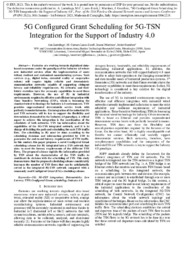Title:
5G Configured Grant Scheduling for 5G-TSN Integration for the Support of Industry 4.0 |
Authors:
larrañaga, Ana 
Lucas-Estañ, M. Carmen
Martinez, Imanol 
Gozalvez, Javier |
Editor:
IEEE |
Department:
Departamentos de la UMH::Ingeniería de Comunicaciones |
Issue Date:
2023 |
URI:
https://hdl.handle.net/11000/33031 |
Abstract:
Factories are evolving towards digitalized databased ecosystems under the paradigm of the Industry 4.0 where
new industrial services allow the implementation of more robust, resilient and customized manufacturing systems. Such services (e.g., digital twins, extended reality or cooperative robots) will require highly reliable and deterministic communication networks capable of supporting stringent latency and reliability requirements. 5G networks and their future evolution have the necessary capabilities to meet these
requirements. However, the use of 5G in industrial environments requires its effective and efficient integration with Time Sensitive Networking (TSN), which is becoming the standard wired technology for Industry 4.0 environments. TSN provides unprecedented deterministic service levels with perfectly bounded latencies. The integration of the industrial 5G and TSN networks will be key to support the flexibility and determinism demanded by the Industry 4.0 paradigm. A critical aspect to achieve this integration is the coordination of the
schedulers of both networks. TSN has information about the capabilities of the 5G-TSN integrated network, and it is in charge of deciding the path and scheduling for each TSN traffic flow. The scheduling in 5G must be done according to the scheduling decisions and information provided by TSN to guarantee the end-to-end latency requirements of TSN traffic. In this context, this paper proposes a novel Configured Grant scheduling scheme for 5G integrated into a TSN network that aims to meet the latency requirements of the different TSN
flows. The proposed scheme exploits the information provided by TSN about the characteristics of the TSN traffic to coordinate its decision with the scheduling of TSN. This study demonstrates that the proposed scheduling scheme considerably increases the number of TSN flows that can be satisfactorily served in the integrated 5G-TSN network compared with a commonly used Configured Grant (CG) scheduling scheme.
|
Keywords/Subjects:
5G
5G-TSN integration
Deterministic
Low Latency
TSN
Configured Grant
scheduling
Industry 4.0 |
Knowledge area:
CDU: Ciencias aplicadas: Ingeniería. Tecnología |
Type of document:
info:eu-repo/semantics/article |
Access rights:
info:eu-repo/semantics/openAccess |
Published in:
18th Wireless On-demand Network systems and Services Conference (WONS 2023), 30th January - 1st February 2023, Madonna di Campiglio, Italy |
Conference name:
18th Wireless On-demand Network systems and Services Conference (WONS 2023), 30th January - 1st February 2023, Madonna di Campiglio, Italy |
Appears in Collections:
Artículos Ingeniería Comunicaciones
|

.png)
